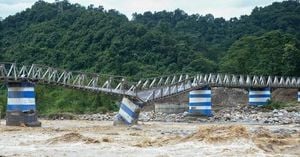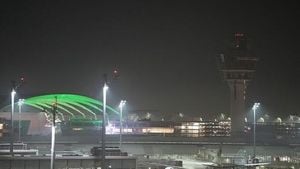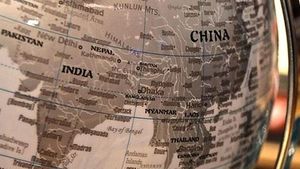A Brazilian cattle rancher has found himself at the center of a groundbreaking legal ruling, facing substantial consequences for extensive deforestation activities in the Amazon rainforest. In a historic ruling, a federal court in Brazil has mandated Dirceu Kruger to pay more than $50 million in damages for the environmental harm he caused through illegal land clearing practices.
The case, initiated by Brazil's attorney general's office on behalf of the Brazilian Institute of Environment and Renewable Natural Resources, better known as Ibama, sets a significant precedent as it marks the largest civil case focused on climate crimes in the country’s history. Following the ruling, Kruger’s assets have been frozen, and he has been ordered to restore the deforested land that he previously inhabited.
Kruger's actions, which resulted in a staggering loss of 5,600 hectares (or approximately 13,838 acres) of public land within the Amazon, included using chainsaws, igniting fires, and planting grass to establish pasture for cattle grazing. The land, formerly rich in biodiversity, was situated in municipalities like Boca do Acre and Lábrea, which belong to the federal government and the state of Amazonas. Satellite images served as undeniable evidence of the vast and severe destruction, and Kruger even confessed to his actions on film.
At the heart of the indictment was the substantial climate impact of Kruger's activities. Experts articulated that burning vegetation not only directly emits greenhouse gases, but also drastically diminishes the earth's ability to absorb carbon dioxide, an essential function of the Amazon rainforest. Presenting their case, the attorney general's office emphasized that damaging this critical ecological zone results in an average emission of 161 tonnes of carbon per hectare, culminating in a total of 901,600 tonnes for the area disturbed by Kruger.
In quantifying the financial damages, the court utilized a valuation of $65 per tonne of carbon emitted, which is a figure based on analyses by the US Environmental Protection Agency. Although this valuation is regarded as relatively conservative by contemporary standards, it rendered Kruger liable for a total damage cost of approximately $50 million. The funds recovered through this penalty are designated for Brazil's national climate emergency fund, aimed at addressing the ongoing threats to the environment.
In addition to the hefty fine, the court ruling imposes strict limitations on Kruger’s operations. He is prohibited from selling cattle or any agricultural products and cannot engage in transactions involving heavy machinery, such as chainsaws or tractors, which are typically used in illegal deforestation. Ultimately, Kruger is also mandated to restore the degraded land, returning it to its former state of being a carbon sink.
This ruling represents more than just a financial penalty; it embodies a milestone in Brazil's efforts towards climate justice. According to Mariana Cirne from the national prosecutor’s office for the defense of climate and the environment, the success of this case is “a matter of climate justice” that aligns with Brazil's objectives to meet national emission targets. Although the decision is not final and could be subject to appeals, it signifies a growing momentum toward holding individuals and corporations accountable for environmental degradation.
The courts in Brazil are increasingly recognizing the cumulative effects of activities that release greenhouse gases, signaling a shift in accountability for climate-related offenses. Rafaela Santos Martins da Rosa, a federal judge involved in climate litigation, noted that quantifying the societal costs of these damages plays a critical role in deterring future offenses. Current legal actions not only target individuals like Kruger but also extend to institutions allegedly engaged in illegal timber trade, such as Importação e Exportação de Madeiras Floresta Verde.
The alarming degradation of the Amazon rainforest is not merely an ecological issue; it's also a pressing global challenge. As studies suggest that half of the Amazon could reach a tipping point by 2050 due to ongoing environmental pressures, legal actions like Kruger’s are essential in counteracting this trend. The Amazon functions as a vital carbon sink, mediating the global climate system, but faces unprecedented threats from both legal and illegal activities.
In earlier developments, Brazil’s Supreme Court mandated the federal government to enforce strategies aimed at controlling and preventing deforestation. This ruling aligns with broader initiatives launched under the leadership of President Luiz Inácio Lula da Silva, reflecting an evolving commitment toward environmental stewardship.
In sum, the case against Dirceu Kruger is emblematic of a larger movement within Brazil to pursue climate justice and emphasize accountability for environmental damage. As the legal landscape advances to address the environmental recklessness that endangers the Amazon, the implications of such rulings reach far beyond the borders of Brazil, underscoring a global imperative to protect vital ecosystems and combat climate change.



